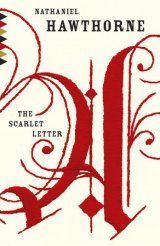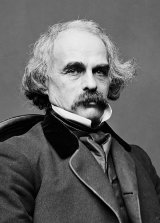The Scarlet Letter Page #6
First published in 1850, The Scarlet Letter is Nathaniel Hawthorne's masterpiece and one of the greatest American novels. Its themes of sin, guilt, and redemption, woven through a story of adultery in the early days of the Massachusetts Colony, are revealed with remarkable psychological penetration and understanding of the human heart.
To observe and define his character, however, under such disadvantages, was as difficult a task as to trace out and build up anew, in imagination, an old fortress, like Ticonderoga, from a view of its grey and broken ruins. Here and there, perchance, the walls may remain almost complete; but elsewhere may be only a shapeless mound, cumbrous with its very strength, and overgrown, through long years of peace and neglect, with grass and alien weeds. Nevertheless, looking at the old warrior with affection--for, slight as was the communication between us, my feeling towards him, like that of all bipeds and quadrupeds who knew him, might not improperly be termed so,--I could discern the main points of his portrait. It was marked with the noble and heroic qualities which showed it to be not a mere accident, but of good right, that he had won a distinguished name. His spirit could never, I conceive, have been characterized by an uneasy activity; it must, at any period of his life, have required an impulse to set him in motion; but once stirred up, with obstacles to overcome, and an adequate object to be attained, it was not in the man to give out or fail. The heat that had formerly pervaded his nature, and which was not yet extinct, was never of the kind that flashes and flickers in a blaze; but rather a deep red glow, as of iron in a furnace. Weight, solidity, firmness--this was the expression of his repose, even in such decay as had crept untimely over him at the period of which I speak. But I could imagine, even then, that, under some excitement which should go deeply into his consciousness--roused by a trumpet's peal, loud enough to awaken all of his energies that were not dead, but only slumbering--he was yet capable of flinging off his infirmities like a sick man's gown, dropping the staff of age to seize a battle-sword, and starting up once more a warrior. And, in so intense a moment his demeanour would have still been calm. Such an exhibition, however, was but to be pictured in fancy; not to be anticipated, nor desired. What I saw in him--as evidently as the indestructible ramparts of Old Ticonderoga, already cited as the most appropriate simile--was the features of stubborn and ponderous endurance, which might well have amounted to obstinacy in his earlier days; of integrity, that, like most of his other endowments, lay in a somewhat heavy mass, and was just as unmalleable or unmanageable as a ton of iron ore; and of benevolence which, fiercely as he led the bayonets on at Chippewa or Fort Erie, I take to be of quite as genuine a stamp as what actuates any or all the polemical philanthropists of the age. He had slain men with his own hand, for aught I know--certainly, they had fallen like blades of grass at the sweep of the scythe before the charge to which his spirit imparted its triumphant energy--but, be that as it might, there was never in his heart so much cruelty as would have brushed the down off a butterfly's wing. I have not known the man to whose innate kindliness I would more confidently make an appeal. Many characteristics--and those, too, which contribute not the least forcibly to impart resemblance in a sketch--must have vanished, or been obscured, before I met the General. All merely graceful attributes are usually the most evanescent; nor does nature adorn the human ruin with blossoms of new beauty, that have their roots and proper nutriment only in the chinks and crevices of decay, as she sows wall-flowers over the ruined fortress of Ticonderoga. Still, even in respect of grace and beauty, there were points well worth noting. A ray of humour, now and then, would make its way through the veil of dim obstruction, and glimmer pleasantly upon our faces. A trait of native elegance, seldom seen in the masculine character after childhood or early youth, was shown in the General's fondness for the sight and fragrance of flowers. An old soldier might be supposed to prize only the bloody laurel on his brow; but here was one who seemed to have a young girl's appreciation of the floral tribe. There, beside the fireplace, the brave old General used to sit; while the Surveyor--though seldom, when it could be avoided, taking upon himself the difficult task of engaging him in conversation--was fond of standing at a distance, and watching his quiet and almost slumberous countenance. He seemed away from us, although we saw him but a few yards off; remote, though we passed close beside his chair; unattainable, though we might have stretched forth our hands and touched his own. It might be that he lived a more real life within his thoughts than amid the unappropriate environment of the Collector's office. The evolutions of the parade; the tumult of the battle; the flourish of old heroic music, heard thirty years before--such scenes and sounds, perhaps, were all alive before his intellectual sense. Meanwhile, the merchants and ship-masters, the spruce clerks and uncouth sailors, entered and departed; the bustle of his commercial and Custom-House life kept up its little murmur round about him; and neither with the men nor their affairs did the General appear to sustain the most distant relation. He was as much out of place as an old sword--now rusty, but which had flashed once in the battle's front, and showed still a bright gleam along its blade--would have been among the inkstands, paper-folders, and mahogany rulers on the Deputy Collector's desk. There was one thing that much aided me in renewing and re-creating the stalwart soldier of the Niagara frontier--the man of true and simple energy. It was the recollection of those memorable words of his--"I'll try, Sir"--spoken on the very verge of a desperate and heroic enterprise, and breathing the soul and spirit of New England hardihood, comprehending all perils, and encountering all. If, in our country, valour were rewarded by heraldic honour, this phrase--which it seems so easy to speak, but which only he, with such a task of danger and glory before him, has ever spoken--would be the best and fittest of all mottoes for the General's shield of arms.
Translation
Translate and read this book in other languages:
Select another language:
- - Select -
- 简体中文 (Chinese - Simplified)
- 繁體中文 (Chinese - Traditional)
- Español (Spanish)
- Esperanto (Esperanto)
- 日本語 (Japanese)
- Português (Portuguese)
- Deutsch (German)
- العربية (Arabic)
- Français (French)
- Русский (Russian)
- ಕನ್ನಡ (Kannada)
- 한국어 (Korean)
- עברית (Hebrew)
- Gaeilge (Irish)
- Українська (Ukrainian)
- اردو (Urdu)
- Magyar (Hungarian)
- मानक हिन्दी (Hindi)
- Indonesia (Indonesian)
- Italiano (Italian)
- தமிழ் (Tamil)
- Türkçe (Turkish)
- తెలుగు (Telugu)
- ภาษาไทย (Thai)
- Tiếng Việt (Vietnamese)
- Čeština (Czech)
- Polski (Polish)
- Bahasa Indonesia (Indonesian)
- Românește (Romanian)
- Nederlands (Dutch)
- Ελληνικά (Greek)
- Latinum (Latin)
- Svenska (Swedish)
- Dansk (Danish)
- Suomi (Finnish)
- فارسی (Persian)
- ייִדיש (Yiddish)
- հայերեն (Armenian)
- Norsk (Norwegian)
- English (English)
Citation
Use the citation below to add this book to your bibliography:
Style:MLAChicagoAPA
"The Scarlet Letter Books." Literature.com. STANDS4 LLC, 2024. Web. 24 Nov. 2024. <https://www.literature.com/book/the_scarlet_letter_160>.




Discuss this The Scarlet Letter book with the community:
Report Comment
We're doing our best to make sure our content is useful, accurate and safe.
If by any chance you spot an inappropriate comment while navigating through our website please use this form to let us know, and we'll take care of it shortly.
Attachment
You need to be logged in to favorite.
Log In